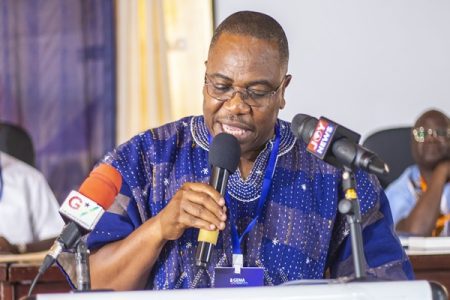The Ghana Evangelical Missions Association (GEMA) has reaffirmed its commitment to global missions and strategic expansion at its 34th Annual General Meeting (AGM) held in Accra.
Speaking at the event, the newly elected President of GEMA, Dr. Godwin Kofi Ahlijah, noted the association’s mission to strengthen evangelism efforts and enhance collaboration among churches and mission agencies in Ghana and beyond.
The meeting brought together mission leaders from across the country to review past activities and unveil GEMA’s five-year strategic plan, which integrates socio-economic initiatives aimed at uplifting marginalized communities.
The AGM served as a platform to review the progress of GEMA’s programmes from January 2024 to March 2025.
Among the key highlights was the Perspectives Training Course, a globally recognized mobilization tool for training mission leaders.
The second training session in Ghana took place in March 2024, with support from the Nigerian Evangelical Missions Association (NEMA), training 25 participants and formalizing a Ghana Coordinating Team.
Another major event celebrated was the International Day for the Unreached (IDU) 2024, observed on May 19th at the University of Ghana.
The event, held in collaboration with various mission organizations, highlighted the need to evangelize the world’s 7,000 unreached people groups.
GEMA President Dr. Godwin Kofi Ahlijah reaffirmed the association’s dedication to national development.
He noted the church’s crucial role in socio-economic progress, conflict resolution, and technological advancement.
Church as a Development Partner
Dr. Ahlijah emphasized the pivotal role the church has played in Ghana’s development, noting that many of the country’s top educational institutions, such as Wesley Girls’ High School and Prempeh College, were founded by missionaries.
He stressed that the church remains a key development partner to the government, particularly in reaching underserved areas.
“We live and fellowship with the people in remote communities. We provide fresh water wells because we acknowledge that government cannot do everything.
Those who think government is a magic wand must understand that it needs the church to reach all corners of the nation,” he said.
Addressing Local Conflicts
On the subject of local conflicts, Dr. Ahlijah called for greater involvement of faith-based organizations in peacebuilding efforts.
“While I am not a security expert, we have seen that in many cases, community members listen to their pastors more than they do to government officials or opinion leaders. It may be time for the church to play a bigger role in conflict resolution,” he suggested.
Building Missionary Bridges
A key focus of GEMA’s strategy is strengthening collaboration both within the church and with external stakeholders.
Dr. Ahlijah stressed the need for unity among mission agencies to maximize their impact.
“There’s very little we can achieve if we don’t unite. Ghana’s Christian population stands at 70.3%. How can we ignore such a significant force in nation-building?” he asked.
He also called for a more seamless integration of faith into daily work, urging professionals to embody Christian principles in their careers.
“You can be an accountant and still be a good missionary and ambassador for Christ,” he noted.
Leveraging Technology for Missionary Work
Recognizing the rapid growth of artificial intelligence and digital technology, Dr. Ahlijah urged the church to embrace innovation to enhance its outreach.
“AI has come to stay, and Africa cannot afford to miss this revolution. When COVID-19 struck, we relied on technology to stay connected. We must now train our best minds in AI and technology for socio-economic growth, or risk being left behind,” he warned.
GEMA’s strategic plan seeks to harness digital tools to expand its missionary efforts, ensuring that the gospel and development initiatives reach even the most remote communities.
Bridging Gaps in Missionary Work
The Guest of Honor, Rev. Enoch Nii Narh Thompson, emphasized the importance of building missionary bridges to address financial, educational, and cultural gaps.
He stressed that churches need to support mission work through financial contributions, while professionals in fields like education and healthcare must leverage their skills to strengthen missionary initiatives.
“We need teachers to help establish schools, medical professionals to set up hospitals, and business-minded individuals to support sustainable projects,” he explained.
He also noted the need for missionaries to bridge cultural gaps by working closely with local communities to adapt the gospel message in ways that are relevant and meaningful.
“Every community has its language and traditions. Missionaries must engage with community members who understand their worldview, making the message of Christ more relatable,” he said.
By CHRISTABEL OBOSHIE ANNAN, Accra
- Friday, April 4, 2025 Newspaper Headlines - 4 April 2025
- Blewett: MTN CEO, a pilot, author, chartered accountant, marathon runner and many more - 3 April 2025
- MTN Ghana launches Y’ello Ladies Network - 3 April 2025

